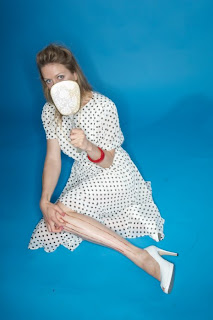amy rutherford
Out of a society obsessed with creating perfection, or at least the illusion of it, where carefully constructed “reality” shows have transformed the ordinary citizens of America into Hollywood’s nouveau riche comes Evan Tsitsias’ new play Aftershock, which played as part of the 2010 SummerWorks Festival at the Factory Theatre Studio.
Aftershock tells the story of Anna, the recent recipient of an extreme makeover at the hands of a team of Los Angeles Executives, as she struggles to reintegrate herself back into her dysfunctional life, with her deranged working class family. Throughout this harrowing and emotional piece, Tsitsias explores the sudden disparity between the superficiality of Anna’s seemingly perfect appearance and the far more ugly and sinister feelings of self doubt, self loathing, despair and the scars from years worth of physical and emotional abuse, that new clothes and plastic surgeries have not resolved. Indeed, Anna is still very much broken and her helplessness has rendered her, reminiscent of Winnie in Samuel Beckett’s Happy Days, literally unable to move.
The fact that Anna is frozen is of little concern to her family members, as they bustle around, fawning over her for the first time, wanting to keep her like a china doll on a pedestal, as a beacon of light to aspire to be; proof that escape from their drudgery is possible. As Anna realizes the true depth of her pain and longs to connect once again to the true image of herself, refusing to deny her battle scars and seeking to renounce the media’s cliché of beauty and to embrace her own inner self, she begins to brutally destroy herself physically.
Rod Ceballos directs this play with electric intensity, highlighting nicely the black humour that encases Anna’s severe pain. With fight director Kara Wooten, the threat of violence is always imminent and Anna’s graphic attempts to injure herself are just gory enough to be disturbing, but not enough to seem alienating or absurd. Aftershock is one of those rare shows that combines an intelligent, dramatic examination of our society, genuine witty dialogue and gruesome moments, almost cinematic in their realism, that make the audience wince.
The cast of Aftershock is uniformly strong. Amy Rutherford gives an appropriately restrained performance as Anna, outwardly with her family members she behaves as one might imagine a Barbie Doll come to life, but Rutherford manages to make her character’s inner turmoil subtlety palpable throughout. Patrick Garrow is sleazy, manipulative and explosive as Gary, Anna’s husband, who, even in his most mundane actions, is always too loud and lacking all gentleness or grace. Allana Harkin is brilliantly pathetic as Anna’s sister Becky, a jealous woman who behaves like an overgrown eleven year old and has to wear a helmet to protect herself from panic attack-induced blackouts. Harkin is able to milk Becky’s absurdity for all her comic potential, while also eliciting empathy for her, as it is clear that she has been conditioned to believe that she is the family’s walking joke. The star of Aftershock is undeniably the powerhouse of comedy, Lynne Griffin, who plays Anna and Becky’s tawdry, caustic, merrily miserable mother, with distinct auras of Roseanne Conner. She may be the villain of this piece, but she is one that the audience derives much glee from hating.
Aftershock is a powerful piece of theatre. I think it could benefit from some further exploration, the concept of Anna being immobilized is not as clear or as powerful as it could be, and the relationship with her daughter Quinn, played earnestly by Catherine Rainville, deserves to be strengthened and enriched. In all, however, Aftershock raises some fascinating questions about the consequences of our society’s obsession with artifice, with the illusion of perfection and Tsitsias refuses to offer us a simplistic solution. Can self mutilation be empowering? Must our traditional conception of “beauty” be destroyed to reclaim a healthier or more genuine ideal? Are we the sum of what the world has done to us and, then, how do we escape when the abuse becomes too much? Aftershock seeks to cut to the bone and, stripping away all pretence, examines that which keeps, even the most broken among us, somehow moving forward.






 World Theatre Day: My God Is It Ever The Time to Invest in Canadian Plays
World Theatre Day: My God Is It Ever The Time to Invest in Canadian Plays 